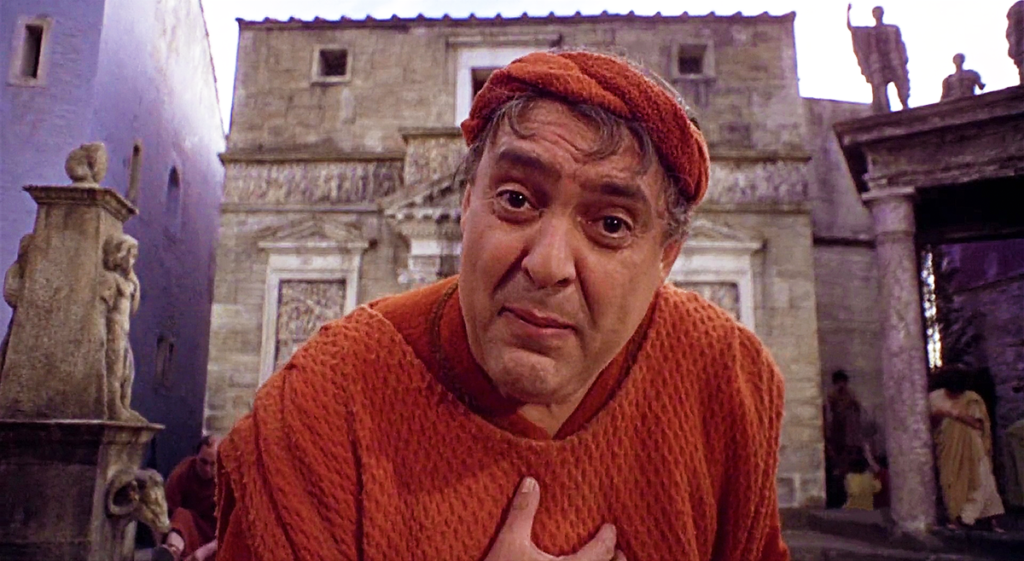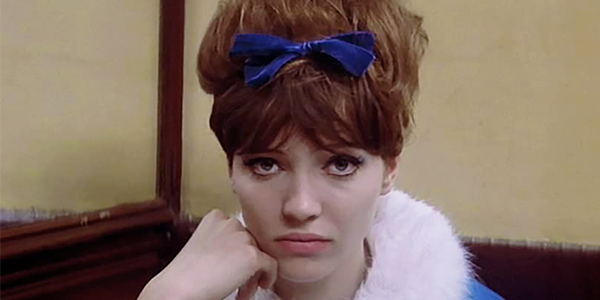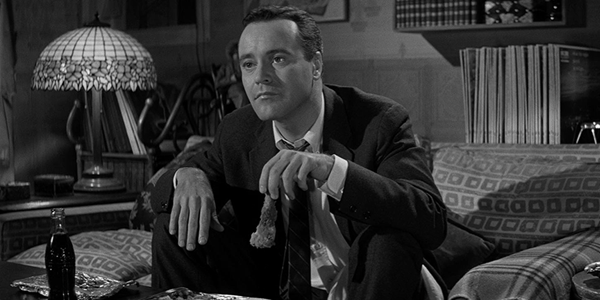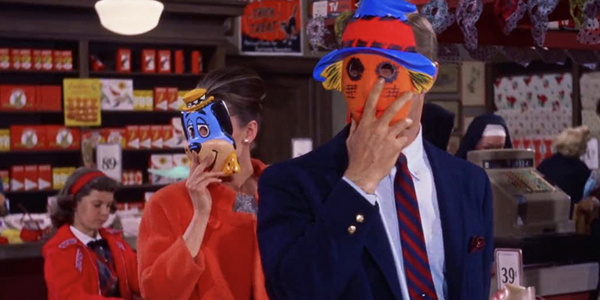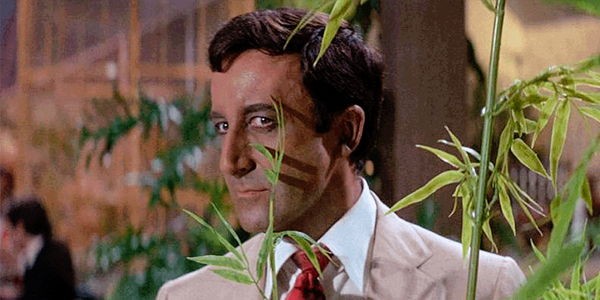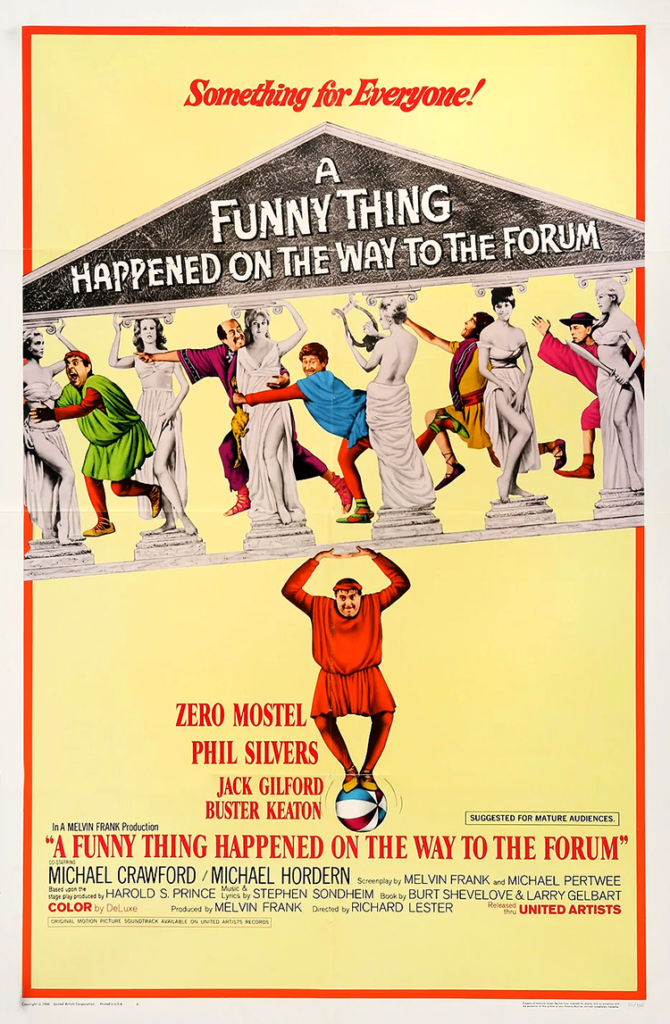related reviews
Sign up for our monthly newsletter
to stay up to date on Cineluxe
A brilliant and still hilarious translation of the stage hit—that is, until you get to the second half
by Michael Gaughn
August 8, 2022
This is going to be a tough one. Anyone who loves comedy and is openminded enough to check out efforts beyond the current flavor of the month and has never come across A Funny Thing Happened on the Way to the Forum owes it to himself to make a beeline for this film. But, be warned that while the first half is a pitch-perfect farce, the second half eventually collapses under its own weight—unless you’re into madcap ‘60s chase scenes. I’m not.
You can also approach this as an important historical document, as the last real manifestation of schtick, adroitly and vigorously performed by Phil Silvers, Jack Gilford, and, of course, the larger-than-life Zero Mostel, and lovingly captured by the seemingly ill-suited Richard Lester. Most of the jokes are on the level of “My dog has no nose,” but the verve and punch are in the timing—not just the individual delivery but the breathtaking synchronization between the three principals and how they manage to bring the almost entirely British supporting cast up to their level and into their world.
All that scenery-chewing causes some collateral damage, but they’re acceptable losses—up to a point. For instance, Michael Hordern’s droll turn as the henpecked husband with a keen eye on the courtesans next door would have stood out in a traditional British comedy but is unfairly drowned out by all the American hamming here. And putting almost all his eggs in the Mostel/Gilford/Silvers basket backfires on Lester when he has to bring the pompous Miles Gloriosus onto the stage. Actor Leon Greene just can’t generate a fraction of the energy summoned up by the three tummlers and his hunky wooden presence manages to suck almost all the life out of the production.
Richard Lester was a curious case. He’ll likely always be best known for his first major film, A Hard Day’s Night, which gave him a bit of a free ride on the Beatles’ coattails but which he took full advantage of, translating Nouvelle Vague filmmaking techniques into the mainstream, changing the look and feel of movies forever. But he proved to be wildly inconsistent, doing intriguing surrealist comedies like How I Won the War and the now ignored but well worth reviving Julie Christie drama Petulia—works that garnered some praise but didn’t draw audiences. He didn’t have another big hit after Hard Day’s Night until he did the Musketeers films for the Salkinds, which led to them enlisting him to reshoot Richard Donner’s Superman II, which then led to the truly dismal Superman III.
Just off the Beatles’ Help!, Lester was a hot director—maybe the hottest—when he took on A Funny Thing, and while the things he does well he does brilliantly, you can sense his reach exceeding his grasp. It would have been easy to completely bungle translating a frantic stage farce to the screen—a dubious honor he managed to earn 10 years later, making a train wreck out of The Ritz—but here he gets almost all of it right, freely mixing up and reinventing the conventions while showing them a deep respect. That is, until those massive miscalculations in the third act. (To be fair, some of the blame for that lies in flaws in the Broadway source material, but the producers never should have allowed Lester to indulge his weakness for silly chase scenes.)
It’s astonishing he was able to maintain the stage-friendly pacing of the lines and bits of business—in other words, didn’t screw up his core ensemble’s inimitable timing—while doing all his experiments with composition, blocking, and cutting. And while he takes the obvious path of turning the production numbers into music videos, he does it playfully and without running roughshod over the source material—like, say, Ken Russell with Tommy. The standout is “Everybody Ought to Have a Maid,” which he treats as the throwaway it is, using it to unleash a cascade of gags that often break the fourth wall.
He was also wise to align himself with DP Nicholas Roeg (Doctor Zhivago, Fahrenheit 451), who documents the squalor of the action’s “less fashionable” quarter of ancient Rome without having it become a drag on the comic mood, conjures up some striking compositions without making the film feel affected, and manages to keep up with, and is sometimes one step ahead of, Lester’s freewheeling approach to the material.
Before mentioning the picture quality, I have to digress for a moment and point out that A Funny Thing was, when I previously saw it about six months ago, one of the films that showed me Amazon had seriously upped its game with HD delivery. It was literally unwatchable a year ago on Prime. Some of the scenes with elaborate action broke up so badly they looked like ravenous paramecia darting under a microscope. All of that is in the past now and the streaming quality has become consistently first-rate. Of course, the quality of Amazon’s transfers is still all over the map (I only made it about 30 seconds into Hangmen Also Die before I had to bail), and it remains about a 50/50 crapshoot whether whatever title you pick will look acceptable in HD. But, all told, a huge leap forward for what was once a joke of a service.
This transfer falls toward the middle of the gamut. It’s relatively faithful to the original film but looks like it could use a little cleanup and color correction. The source seems to have suffered from benign neglect, but a few of the sequences are vibrant enough to suggest what some judicious and respectful attention could yield, likely significantly upping the film’s impact.
The audio is another instance of that phenomena I’ve been coming across lately in films from the ‘60s and early ‘70s—pristine stereo music tracks with decent dynamic range sounding all out of proportion to relatively flat all-but-monophonic dialogue tracks. Since this movie was originally mixed in stereo, it’s possible this is faithful to the initial release, but the disparity is a little jarring.
Comedy has gotten so jaded and brutal that it’s become fashionable to dismiss anything older as sentimental and naive. That’s a mistake in general, but a serious mistake here. A Funny Thing’s roots stretch all the way back to Plautus, traveling, among other places, through the French farceurs and the often hardknock worlds of vaudeville and early TV to arrive at Broadway and then the movies. It’s a hell of a genealogy and tradition—which this film both honors and aggressively mucks around with without once acting like it feels superior to its heritage or its material. In the current stifling climate, just being exposed to something that uncynical can be bracing.
Michael Gaughn—The Absolute Sound, The Perfect Vision, Wideband, Stereo Review, Sound & Vision, The Rayva Roundtable, marketing, product design, some theater designs, a couple TV shows, some commercials, and now this.
PICTURE | The transfer is relatively faithful to the original film but looks like it could use a little cleanup and color correction, which would likely significantly up its impact
SOUND | The pristine stereo music tracks exhibit decent dynamic range but sound out of proportion to the relatively flat all-but-monophonic dialogue tracks
CLICK ON THE IMAGE TO ENLARGE
© 2023 Cineluxe LLC


